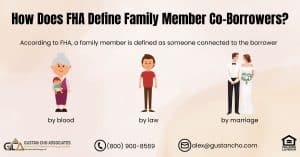This guide covers buying a home from a family member with no down payment or closing costs with a gift of equity. Buying a home from a family member is becoming more and more common. Homebuyers can get a discounted price on a home by buying a home from a family member.
This is a great benefit during high home values and skyrocketing home prices. Homeowners who are retiring and need to downgrade will feel better selling their homes to a family member and keeping the home in the family.
Homebuyers buying a home from a family member can purchase the home with little to no money down due to the gift of equity from the selling family member. If structured right, the homebuyer can purchase the home without a down payment or closing costs.
Buying a Home From a Family Member: Non-Arms Length Transactions
Buying a home from a family member is classified as a non-arms-length transaction. Arm’s length transactions are home purchase transactions that a buyer and seller are strangers to and unrelated to. Non-arms-length transactions are home purchase transactions that both the homebuyers and sellers are related to or have a close relationship with each other. There are strict mortgage regulations by lenders on non-arms-length home purchase transactions. Speak With Our Loan Officer for Mortgage Loans
The Advantage of Buying a Home From a Family Member
There are many benefits of buying a home from a family member. Most homebuyers will get a gift of equity which means a discounted price on the home. Buyers can trust the seller. The homebuyer will know the home, its neighbors, and the town. There are advantages for both homebuyers and sellers.
The home seller will keep the home in the family. Many homeowners have developed a personal attachment to their homes over the years. Selling it to a family member will offer comfort in having a family member as the new owner.
Buyers will know the home and have knowledge of any repairs that need to be done. If major repairs need to be done, the seller will be more willing to negotiate the cost of the repairs. Many homebuyers are priced out of the expensive housing market. Buying a home from a family member is often at a discount.
Most homebuyers buying a home from a family member will purchase them at a substantial discount, called a gift of equity. Other benefits of buying a home from a family member include not coming up with a down payment or closing costs. In many instances, the home seller can offer owner financing, or the buyer can have the option to assume their mortgage.
The biggest benefit of buying a home from a family member is buying the home at a discount. This is especially a big deal during times of skyrocketing home prices. Due to skyrocketing home prices, many homebuyers are priced out of the housing market.
Gift of Equity: Buying a Home Below Market Value

Mortgage lenders have strict guidelines regarding the gift of equity when buying a home from a family member. Lenders will treat the transaction as a gift of equity home purchase on homebuyers buying a home at a discount from a family member. Homebuyers and sellers should check their tax implications on a gift of equity home purchase/sales transaction from their accountants or tax attorneys. Click here to apply for loan for your home purchase
Down Payment and Closing Costs on Home Purchase
All home purchase transactions normally require a down payment and come with closing costs. The down payment and closing costs can be waived when buying a home from a family member via a gift of equity.
A gift of equity is the seller giving the homebuyer a discounted price on the home purchase which is equivalent to a gift. Lenders will get the market value of the home from the home appraisal. The gift of equity is the appraised value less the actual sales price.
The homebuyer must determine the difference if the gift of equity is less than the down payment or closing costs required on the sales transaction. The team at Gustan Cho Associates are experts in the gift of equity home purchase transactions. Gustan Cho Associates has no lender overlays on government and conventional loans. Gustan Cho Associates offers dozens of non-QM and alternative mortgage loan programs. Gustan Cho Associates has dozens of lending relationships with non-QM wholesale lenders.
How Does Gift of Equity Home Purchase Transactions Work For Home Sellers
If the home seller has a mortgage on the home, the home’s equity is the maximum amount the seller can make a gift of equity to the homebuyer. The seller can make a larger gift of equity, but then the seller must pay the mortgage loan balance. If the home seller has no mortgage on the property, it is up to the home seller as to how much gift of equity they want to give the homebuyer.
Home sellers without a mortgage can sell the home via owner financing. Each party should hire attorneys to avoid misunderstandings on the home purchase/sales transaction. Remember that a home purchase/sale is a large business transaction; the book should do it.
Buying Out a Family Member’s Home By Paying Off The Reverse Mortgage
There are instances where a senior homeowner with a reverse mortgage has passed. The lender of the reverse mortgage will allow the deceased homeowner’s siblings to buy out the reverse mortgage. The lender will give time for the sibling or heirs of the deceased homeowner to reclaim the property before starting the property transfer process.
The heirs of the property should decide on who will take possession of the property and the buyout number of the heirs giving up their rights to the property. If the property is upside down, it will be best to surrender it to the lender. Buying a home for your family with loan, Click here
FAQs: Buying a Home From a Family Member With a Gift of Equity
- What does buying a home from a family member with a gift of equity mean? Buying a home from a family member with a gift of equity involves purchasing the Home at a discounted price. The seller (family member) provides a “gift” by selling the Home for less than its market value, which often covers the down payment and closing costs.
- What is a non-arms length transaction? A non-arms length transaction occurs when the buyer and seller have a close relationship, such as being family members. This contrasts with an arm’s length transaction, where the parties are unrelated and act independently.
- What are the advantages of buying a home from a family member? Buying a home from a family member often comes with a discounted price, trust and familiarity, the possibility of keeping the Home in the family, negotiable repairs, and flexible financing options.
- How does a gift of equity work? A gift of equity is when the seller offers the buyer a discount on the home’s market value. This discount can cover the down payment and closing costs. Lenders will appraise the home to determine its market value and calculate the gift of equity as the difference between the appraised value and the sale price.
- Are there tax implications for a gift of equity? Buyers and sellers should seek advice from tax experts to comprehend the tax consequences of a gift of equity. The seller might face tax consequences, and the buyer needs to understand how the gift is treated for tax purposes.
- Do I need a down payment or closing costs when buying from a family member? Typically, the down payment and closing costs can be covered by the seller’s gift of equity. The purchaser must cover any deficit if the gift of equity does not fulfill the required down payment or closing costs.
- What are the lender’s requirements for a gift of equity? Lenders have strict guidelines for the gift of equity transactions, including documentation proving the gift and an appraisal to confirm the home’s market value. It’s essential to work with a lender familiar with these transactions.
- How should buyers and sellers structure the transaction to avoid misunderstandings? Both parties should hire attorneys to ensure all legal aspects are covered and to avoid misunderstandings. Real estate transactions are significant financial dealings, and professional guidance helps protect both parties’ interests.
- What happens if the home seller has a mortgage on the property? If the seller has a mortgage, the maximum gift of equity they can provide is limited by the home’s equity. If the seller wants to give a larger gift, the remaining mortgage balance must be paid off.
- Can family members buy out a home with a reverse mortgage? Yes, in cases where a senior homeowner with a reverse mortgage passes away, the lender allows family members to buy out the reverse mortgage. The heirs must decide on the buyout terms and negotiate with the lender.
- Who can help with a gift of equity home purchase transactions? Gustan Cho Associates is experienced in assisting with the gift of equity home purchase transactions. They provide a variety of mortgage loan programs without lender overlays and have built strong connections with non-QM wholesale lenders to offer adaptable financing options.
If you have any questions about Buying a Home From a Family Member With a Gift of Equity or you need to qualify for loans with a lender with no overlays, please contact us at 800-900-8569. Text us for a faster response. Or email us at alex@gustancho.com. The team at Gustan Cho Associates is available 7 days a week, on evenings, weekends, and holidays.
This blog about Buying a Home From a Family Member With a Gift of Equity was updated on May 15th, 2024.








